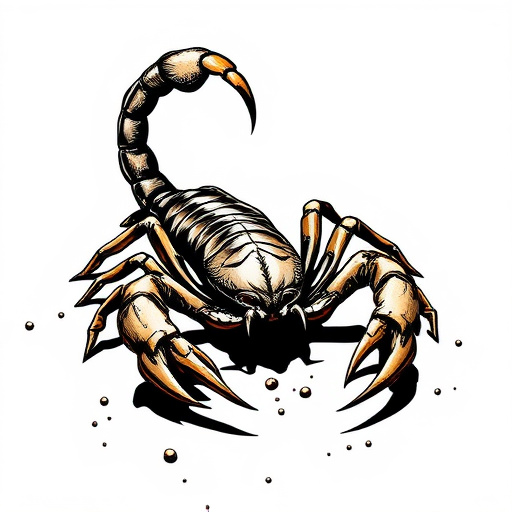Scorpion control in Tucson, Arizona's Catalina Foothills is strictly regulated to balance public safety and environmental preservation. Licensed professionals employ eco-friendly methods like water sprays, IPM techniques, and safe pesticides, adhering to city guidelines that prohibit toxic chemicals. Residents are encouraged to report sightings, inspect properties, and seek expert help for responsible scorpion removal, contributing to a safe and harmonious living environment.
“In the scenic Catalina Foothills region of Tucson, Arizona, local regulations play a vital role in managing scorpion populations while ensuring the safety of residents. This comprehensive guide delves into the intricate details of scorpion control and removal practices specific to this area. From understanding the licensing requirements for professionals to exploring permitted control methods, we equip citizens with knowledge to navigate these regulations effectively. Discover how Tucson’s approach to scorpion management fosters a safe and harmonious coexistence with these intriguing creatures.”
- Understanding Catalina Foothills' Scorpion Control Regulations
- Licensing Requirements for Scorpion Removal Professionals in Tucson
- Permitted Methods of Scorpion Control and Extermination
- Handling and Disposal of Scorpions in Compliance with Local Laws
- Citizen Responsibilities in Managing Scorpion Populations
- Resources and Support for Safe Scorpion Removal in Tucson
Understanding Catalina Foothills' Scorpion Control Regulations

In the beautiful but arid landscape of Catalina Foothills, Tucson, Arizona, local regulations play a crucial role in managing and controlling scorpion populations. These regulations are designed to balance the preservation of natural ecosystems with public safety concerns. Understanding these rules is essential for residents and visitors alike, especially those interested in scorpion control Tucson methods.
The city of Tucson has specific guidelines for scorpion removal and control, focusing on safe and humane practices. This includes restrictions on certain chemicals and pesticides known to be harmful to local wildlife. For instance, the use of high-pressure water sprays is recommended as an initial step in scorpion control Tucson procedures. Professional services adhering to these regulations employ eco-friendly methods, ensuring that scorpions are removed without causing damage to other species or contaminating the environment.
Licensing Requirements for Scorpion Removal Professionals in Tucson

In the vibrant landscape of Tucson, especially within the Catalina Foothills, managing scorpions is a unique challenge. For professionals engaged in scorpion control and removal, navigating local regulations is paramount. To ensure effective and safe practices, all individuals or companies offering scorpion removal services must be licensed by the city of Tucson. This licensing requirement underscores the importance of professional expertise and adherence to established protocols for handling these stinging pests.
The licensing process involves rigorous standards and inspections, ensuring that only qualified and competent practitioners are permitted to operate within the area. Those seeking to provide scorpion control services in Tucson must demonstrate knowledge of pest management, safety procedures, and environmental considerations specific to the region. This stringent approach not only safeguards residents but also promotes reputable practices in the ever-present battle against scorpions in the local ecosystem.
Permitted Methods of Scorpion Control and Extermination

In the Catalina Foothills area, scorpion control and removal are subject to specific local regulations designed to protect both residents and the environment. Permitted methods typically include professional pest control services that employ integrated pest management (IPM) strategies. These approaches prioritize non-chemical solutions first, such as habitat modification and mechanical removal, while reserving chemical interventions for targeted applications.
For scorpion control in Tucson and the Catalina Foothills, residential properties must adhere to guidelines that prohibit the use of toxic chemicals in areas accessible to pets or children. Professional exterminators are trained to identify scorpion species, their habits, and safe, effective methods tailored to local conditions. This includes the responsible use of low-risk pesticides when necessary, ensuring a balance between effectiveness and environmental safety.
Handling and Disposal of Scorpions in Compliance with Local Laws

In Catalina Foothills, the handling and disposal of scorpions are strictly regulated to maintain a safe and healthy environment for residents and local wildlife. When addressing scorpion infestations, it’s crucial to adhere to Tucson’s local regulations for scorpion control. This includes proper containment and removal techniques, ensuring that these venomous creatures are handled and disposed of humanely and in compliance with the law.
Residents who choose to engage in scorpion control measures should opt for licensed professionals or methods approved by local authorities. Disposing of scorpions caught inside homes or structures must be done responsibly, typically by releasing them back into their natural habitat outside of city limits. Following these guidelines is essential for both effective scorpion control and Tucson’s environmental preservation.
Citizen Responsibilities in Managing Scorpion Populations

In the Catalina Foothills area, scorpion control is a shared responsibility between citizens and local authorities. Homeowners and residents play a crucial role in managing scorpion populations through proactive measures. This includes regularly inspecting their properties for scorpion habitats, such as rock piles or secluded areas, and taking steps to eliminate potential food sources like insects and other small creatures. Using appropriate pest control products specifically designed for scorpions is allowed but must be done responsibly, following all label instructions to avoid environmental and health hazards.
Citizens are also encouraged to report scorpion sightings to local authorities, providing detailed information about the species, location, and number of scorpions observed. This data helps track scorpion activity and guides targeted removal efforts. By collaborating in these ways, Catalina Foothills residents can effectively manage scorpion populations while ensuring the safety of their communities, making Tucson a more pleasant place to live, work, and play.
Resources and Support for Safe Scorpion Removal in Tucson

In Catalina Foothills, scorpion control and removal is taken seriously, with various resources available to support residents in dealing with these stinging insects safely. The City of Tucson offers extensive information on scorpion management, including guidelines for professional pest control services and DIY methods. Local authorities emphasize the importance of proper identification, as different species require specific approaches. For instance, the common desert scorpion is typically more aggressive during the warmer months, necessitating tailored strategies for effective removal.
Tucson’s health department provides regular updates on scorpion activity and safe handling practices. They also collaborate with reputable pest control companies to ensure residents have access to qualified professionals who follow environmentally friendly methods. Additionally, community organizations and local businesses often host educational workshops on scorpion control Tucson, empowering folks to take proactive measures and minimize the presence of these arachnids in their homes and gardens.
When it comes to scorpion control in Catalina Foothills, understanding and adhering to local regulations is paramount. By ensuring professionals are licensed and employing permitted methods, residents can effectively manage scorpion populations while staying compliant with Tucson’s guidelines for safe removal. Remember, citizen responsibility plays a key role in maintaining a balanced ecosystem, so be sure to familiarize yourself with these important regulations and reach out to trusted resources for additional support when needed. This proactive approach will help keep your home and community free from scorpions, promoting both safety and environmental harmony in the process.
